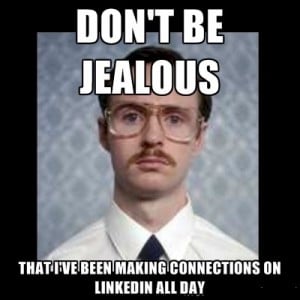Question
You preach that most jobs are found through personal contacts. There is no way to pursue as many job opportunities via contacts as by applying for jobs online. Maybe it takes a thousand applications on Indeed and LinkedIn, but that’s automation at work. Meanwhile, there’s no way to get 1,000 job opportunities through 1,000 contacts when you’re looking for a job. It’s an odds game any way you look at it. So deny that and tell me why I’m wrong, please.
Nick’s Reply
 In an economy where employers are struggling to find workers among millions in all the online databases, there’s a premium on automation. There are so many resumes, profiles and applications to sort through! When a task is as repetitive as reviewing job applications, especially when human time and effort are so expensive, it’s always better to let automation do the job. Isn’t it?
In an economy where employers are struggling to find workers among millions in all the online databases, there’s a premium on automation. There are so many resumes, profiles and applications to sort through! When a task is as repetitive as reviewing job applications, especially when human time and effort are so expensive, it’s always better to let automation do the job. Isn’t it?
While “Automate it!” has become a business mantra in HR, not every business objective is served by automation. Just because databases can deliver more job listings and more job applicants doesn’t mean “more is better.” Some things require a personal approach.
We have long discussed the failure of automated tools for job hunting and hiring. It’s worth considering why personal contacts – which are the source of 40%-70% of new jobs and new hires – work so much better. It’s partly because less is better.
Personal contacts are active.
The job boards are passive and impersonal. One job hunter will wait until a database matches their “keywords” to a job description. Another – an active job hunter – won’t wait. They will use personal contacts to get introduced to a manager directly.
Guess who gets the manager’s attention first?
“Who you know” is a good filtering mechanism.
Job boards and Applicant Tracking Systems (ATSes) are lousy “people filters” because they’re bit buckets. That is, they sort ASCII characters, not character. Managers put a premium on the personal endorsement of a candidate by a professional friend or associate. Why?
It’s a matter of trust. The word of a professional contact is much more reliable than a resume that came from an impersonal database. Managers don’t like to take chances.
Personal contacts yield more highly motivated people.
It takes no motivation to apply for the nth job on a job board, and job boards don’t measure anyone’s interest in a particular job. (Wow — when will HR realize this while it advertises for truly motivated applicants?) Instead, these databases deliver all “matches.”
A candidate who makes the effort to develop a personal contact with the right manager is almost always more interested and motivated than most online applicants. Guess who is more likely to get an interview? (When will HR realize that a referral from a trusted contact saves time and cost — because it comes with a credible, built-in reference?)
Personal contacts anticipate job openings and good candidates.
By the time a job (or resume) is posted, the game is over. The only way to find out about a job before the teeming hordes apply for it is to have a good inside contact that tips you off before the job is advertised.
Likewise, the best way to hire a great candidate is to know about them before they start looking for a new job. Only personal contacts yield hidden opportunities. Well, headhunters do, too — for big, fat search fees.
Personal contacts can’t be automated. They require time and effort, personal attention, good judgment, motivation, and the ability to anticipate events before they happen. Who you know — and who knows you — matters. That’s why most jobs are filled through personal contacts.
How much time and effort do you invest in personal contacts? Do you agree that it’s all about “who you know?”
: :




 “The best way to land a new job is to make new contacts. Hang out with people who do the work you want to do.” Nick, you often write that and it makes me misty for the days when that was possible. [
“The best way to land a new job is to make new contacts. Hang out with people who do the work you want to do.” Nick, you often write that and it makes me misty for the days when that was possible. [ Nick’s Quick Advice
Nick’s Quick Advice


